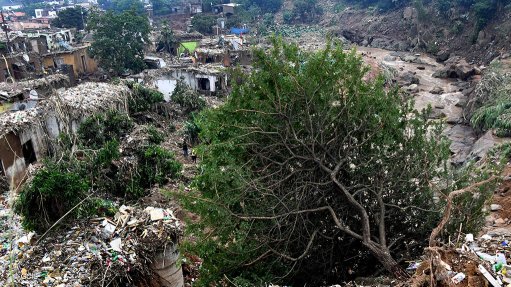
Poor planning, historic infrastructure issues and corruption has left SA communities and municipalities unprepared for the devastation the climate crisis can wreak on the country, according to an official at the South African Local Government Association (SALGA).
During a webinar about the impact of climate change and changing weather patterns on society, Salga's advisor on climate change, Slindile Maphumulo unpacked whether municipal infrastructure is responsive to climate change. The webinar was hosted by the Government Communication and Information System, the Department of Forestry, Fisheries and Environment and Salga.
It comes off the back of recent flooding events in KwaZulu-Natal in which more than 400 people lost their lives and around 40 000 others were displaced. The heavy rains and floods also damaged physical infrastructure such as bridges, roads, ports, electricity grids, internet and communication systems.
Maphumulo said that while climate change - linked to sea-level rise and extreme weather events - has a real impact on people's lives, poor infrastructure and planning have also made people more vulnerable to these impacts. "Poor planning is causing people to suffer a great deal," said Maphumulo.
South Africa's infrastructure was designed decades ago and did not consider the future climate, she explained. On the other hand, newer infrastructure is also compromised by corruption in procurement processes that may result in incompetent service providers - or those without enough experience - being appointed to deliver the infrastructure, Maphumulo highlighted.
Maphumulo recalled how a bridge in Mpumalanga had been swept away in floods multiple times because it was not designed to respond to the climate crisis.
"Communities or municipalities are just not prepared to face climate-related threats," said Maphumulo.
Town planning in some municipalities does not account for climate change impacts, she explained. Informal settlements sometimes spring up in wetlands and flood lines, making these people vulnerable to the impacts of extreme weather events. Government exacerbates the problem by providing basic services to these settlements and inadvertently encourages people to live in these unsafe spaces, Maphumulo explained.
An assessment by Salga on District Development Model plans indicates that most municipalities are not climate responsive. The majority of districts have incomplete climate change response strategies, despite assistance provided by Salga and the DFFE, Maphumulo said.
However, SA's eight metros are taking measures to prevent climate change by reducing emissions.
Five cities - Tshwane, Johannesburg, Ekurhuleni, eThekwini and Cape Town form part of the C40 network - a global network of mayors taking action to respond to the climate crisis. Inter-governmental and inter-city partnerships are valuable in assisting the local government sector, especially in equipping them to respond to climate change.
Salga has several units dedicated to supporting municipalities with climate change mitigation and adaptation. These include a sustainability unit focused on climate change, disaster and emergency services and an energy unit focused on renewable energy and efficiency. Salga also lobbies for financing from various partners to support municipal projects geared at climate resilience. Salga is also working to incorporate climate change into municipal planning systems and is building capacity in climate change management, Maphumulo added.
Maphumulo explained that climate resilient education is essential for city planners, emergency planners and all community planners to prepare for climate change.
Responding to climate change is not just the government's responsibility but requires input from stakeholders across society, she added. "Citizens and government must come together to respond to climate change."